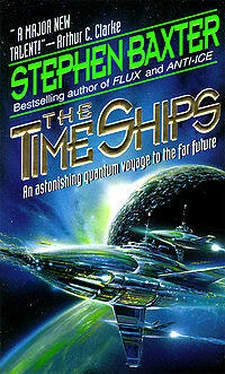My eyes adjusted to the illumination, and I stood up and inspected myself. I was whole, and, it seemed, hale; I could find no trace on my hands or arms of the action of that diffuse pyramid-creature on my skin. I noticed a series of white traces, though, in the fabric of my jungle-twill shirt and trousers; when I ran my finger along these, I found low, ridged seams, as if clumsy repairs had been effected in my clothes.
I was in a chamber perhaps twelve feet across and about as high — and it was the most peculiar room I had visited in all my travels through time so far. To picture it, you must begin with a hotel room of the late nineteenth century. But the room was not constructed on the rectangular pattern common in my day; rather, it was a rounded cone, something like the inside of a tent. There was no door, and no furniture of any sort. The floor was covered by an even layer of sand, in which I could see the indentations where I had slept.
On the walls there was a rather garish paper — a purple, flock concoction — and what looked like window-frames, set about with heavy curtains. But the frames contained not glass, but only panels coated with more of the flock-paper.
There was no light source in the room. Instead, a steady and diffuse glow permeated the air, like the light of a cloudy day. I was by now convinced, however, that the illumination I saw was some artifact of my spectacles rather than anything physical. The ceiling above me was an ornate affair, decorated with the most remarkable paintings. Here and there in that baroque cascade I could make out fragments of the human form, but so jumbled about and distorted that the design was impossible to make out: it was not grotesque, but instead clumsy and confused — as if the artist had the technical ability of a Michelangelo, but the vision of a retarded child. And so you have it: the elements, I suppose, of a cheap hotel room of my day but transmogrified into this peculiar geometry, like something out of a dream!
I walked about, and my boots crunched on the coarse sand. I found no seam in the walls, no hint of a door. In one part of the room there was a cubicle, about three feet on a side, made of white porcelain. When I stepped off the sand and onto the porcelain platform, steam hissed, quite unexpectedly, from vents in the walls. I stepped back, startled, and the jets desisted; the lingering steam lapped about my face.
I found a series of small bowls set on the sand. They were a hand’s-breadth across and had shallow rims, like saucers. Some of the bowls contained water, and others portions of food: simple stuff, fruit and nuts and berries and the like, but nothing I could readily recognize. Finding myself thirsty, I drained a couple of the water-bowls. I found the bowls clumsy to use; their shallow profiles gave them a tendency to dump their contents over my chin, and they were less like cups, I thought, than the dishes one uses to water a dog or cat. I nibbled at a little of the food; the taste of the fruit pieces was bland but acceptable.
After this my hands and lips were left sticky, and I looked about for a sink or toilet facilities. There were none, of course; and I resorted to rinsing myself with the contents of another of the little water-bowls, and drying my face on a corner of my shirt.
I probed at the dummy windows, and leaped up, trying to poke at the clumsy ceiling designs, but to no avail; the surface of the walls and floor was as smooth as an eggshell’s but unbreachable. I dug out some of the sand on the floor and found that it penetrated to a depth of nine inches or a foot; under it lay a mosaic of brightly colored fragments, rather after the Roman style — but, like the ceiling, the mosaic depicted no portrait or scene I could discern, but rather a fragmentary jumble of designs.
I was quite alone, and there was no sound from beyond the walls: no sound in my universe, in fact, save the rustle of my own breathing, the thump of my heart the very noises which I had welcomed back with such vigor, so recently!
After a time, certain human needs asserted themselves. I resisted these pressures as long as I could, but at last was forced to resort to digging shallow pits in the sand, for the purpose of relieving myself.
As I covered over the first of these pits I felt the most extraordinary shame. I wondered what the Starmen of this remote 1891 were making of this performance!
When I tired, I settled myself in the sand, with my back to the wall of the room. At first I kept the light-spectacles on, but I found the illumination too bright to allow me to rest; so I doffed the spectacles, and kept them wrapped around my hand while I slept.
So began my sojourn in that bizarre cage of a room. As my initial fear subsided, a restless boredom crept over me. It was an imprisonment reminiscent of my time in the Morlocks’ Cage of Light, and I had come away from that without any wish to repeat the experience. I came to feel that anything, even the intrusion of danger, would be preferable than to remain in this dull, seamless prison. My exile in the Palaeocene — fifty million years from the nearest newspaper — had cured me of my old impulse to read, I think; but still, at times I thought I should go mad for lack of someone to talk to.
The bowls of food and water were filled up each time I slept. I never determined the mechanism by which this was done. I saw no evidence of an extruding machinery like the Morlocks’; but neither did I ever witness the refilling of a bowl by any semblance of attendant. Once, as an experiment, I went to sleep with a bowl buried beneath my body. I awoke to find a soggy sensation under my ribs. When I lifted myself, I found the bowl had filled with water once more, as if by some miraculous process.
I came to the tentative conclusion that, somehow, a subtle machinery in the bowls themselves was assembling the contents either from the substance of the bowls, or from the material of the air. I thought though I had no desire to investigate! — that my buried waste was broken down by the same discreet mechanisms. It was a bizarre, and not very appetizing, prospect.
[2]
Experiments and Reflections
After three or four days I felt the need to get myself properly clean. As I have said, there was no semblance of toilet facilities here, and I grew dissatisfied with the cat-licks I was able to perform with my bowls of drinking water. I longed for a bath, or, better still, a swim in my Palaeocene Sea.
It took me some time — you may think me rather dull on this point — before I turned my attention again to that cubicle of porcelain I have described, ignored since my first tentative exploration of the chamber. I approached that cubicle now, and placed one cautious foot onto the porcelain base. Once more, steam spurted from the walls.
Suddenly I understood. With a surge of enthusiasm I stripped off my boots and garments (I retained my spectacles, though) and stepped into the little cubicle. Steam billowed all around me; the perspiration started from my skin, and moisture gathered over my spectacles. I had expected that the steam would blow out around the room, turning it all into something of a sauna. But the steam confined itself to the cubicle area, no doubt thanks to some arrangement involving differences in air pressure.
This was my bath-room, after all: it was not kitted out like the facilities of my own day — but why should it have been? My house in the Petersham Road was lost in a different History, after all. I recalled that the Romans, for example, had known nothing of soap or detergents; they had been forced to resort to this sort of poaching to sweat the dirt out of their pores. And the steam cleansing proved quite effective in my case, although, lacking the scrapers the Romans had used, I was forced to use my finger-nails to drag the accumulated muck off my flesh.
Читать дальше
Конец ознакомительного отрывка
Купить книгу









